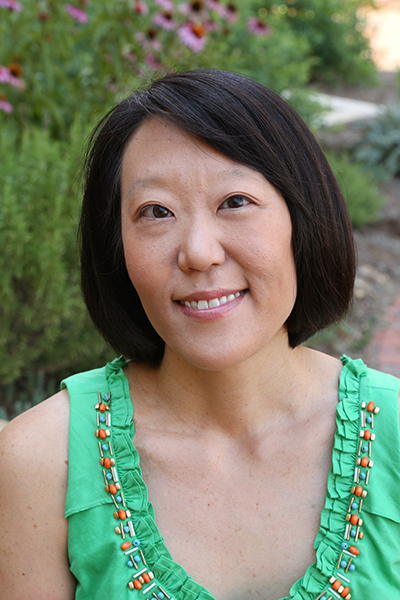Arlene Chung, MD, MHA, MMCi, the 2014 James Woods Junior Faculty Award winner, sees a future where technology and data analytics will drastically improve health care outcomes for patients everywhere. And at UNC, we’re getting a glimpse at the future right now.

In the middle of the peanut farms and soybean fields sits the small town of Williamston, NC, where as a kid, Arlene Chung would collect from her front porch fruits and vegetables, pies and cookies that patients left as a token of gratitude for her father, a solo family physician who’d take care of patients whether or not they could afford it.
She learned early on that, if not for her father, many people in that tiny town between Rocky Mount and the Outer Banks would not have received healthcare.
Fast forward three decades. Arlene Chung is now Dr. Chung, assistant professor of medicine and pediatrics, and she knows that there are even more patients in tiny towns like Williamston and cities like Raleigh who can’t afford health care and those who can don’t always get the care they need. She’s trying to change that with the help of something called clinical informatics – an emerging field and new clinical subspecialty in which doctors and researchers harness technology and data to improve healthcare for individual patients and populations of patients.
For her work, she is this year’s recipient of the James W. Woods Junior Faculty Award, which supports research and scholarship of junior faculty in the UNC School of Medicine.
We sat down with Dr. Chung for a Five Questions feature to learn about how she chose to follow in her father’s footsteps, her non-traditional path to medical school, and the importance of clinical informatics research at UNC.
![]() What were your aspirations when you were a youth, and what were the driving forces behind you majoring in literature and minoring in Asian / African languages and literature at Duke?
What were your aspirations when you were a youth, and what were the driving forces behind you majoring in literature and minoring in Asian / African languages and literature at Duke?
I actually started at Duke as a biology major because I knew I was interested in medicine but I wasn’t 100 percent sure about it.
When I was young, my mom and dad instilled a love of reading. I read tons of books that kids probably don’t typically read until high school—books like Siddhartha, and I loved reading all of them. At Duke, I took an intro literature class and really loved it. I knew that if I was going into medicine, then I would probably have to take science classes as pre-med requirements anyway, so I wanted to major in something different. I loved the thought process behind critically appraising books, interpreting them, and finding meaning for my life, so I switched from biology to literature my junior year.
As for the Asian /African Languages and Literature minor, this was partly due to curiosity about my Korean background. We always spoke Korean at home, but at Duke, I was exposed to Korean literature. I learned to read classical Korean literature in my mother language, and I got to go back to my roots in a sense through taking these classes.
![]() Why did you choose to get a Master’s in Healthcare Administration from UNC Gillings School of Global Public Health?
Why did you choose to get a Master’s in Healthcare Administration from UNC Gillings School of Global Public Health?
Medical school was always in the back of my mind, but I wanted to make sure it was my passion. I really wanted to know about public health infrastructure and the policies that shape the delivery of care for patients. Being from a small town where it was hard for people to get care or get access to resources definitely shaped the way I think about healthcare.
I wanted to know about how I could change the system from a policy perspective so I went to graduate school. I thought this might be my career. If I could impact care and help people in that way then that would probably be equally as fulfilling and challenging as being a doctor.
